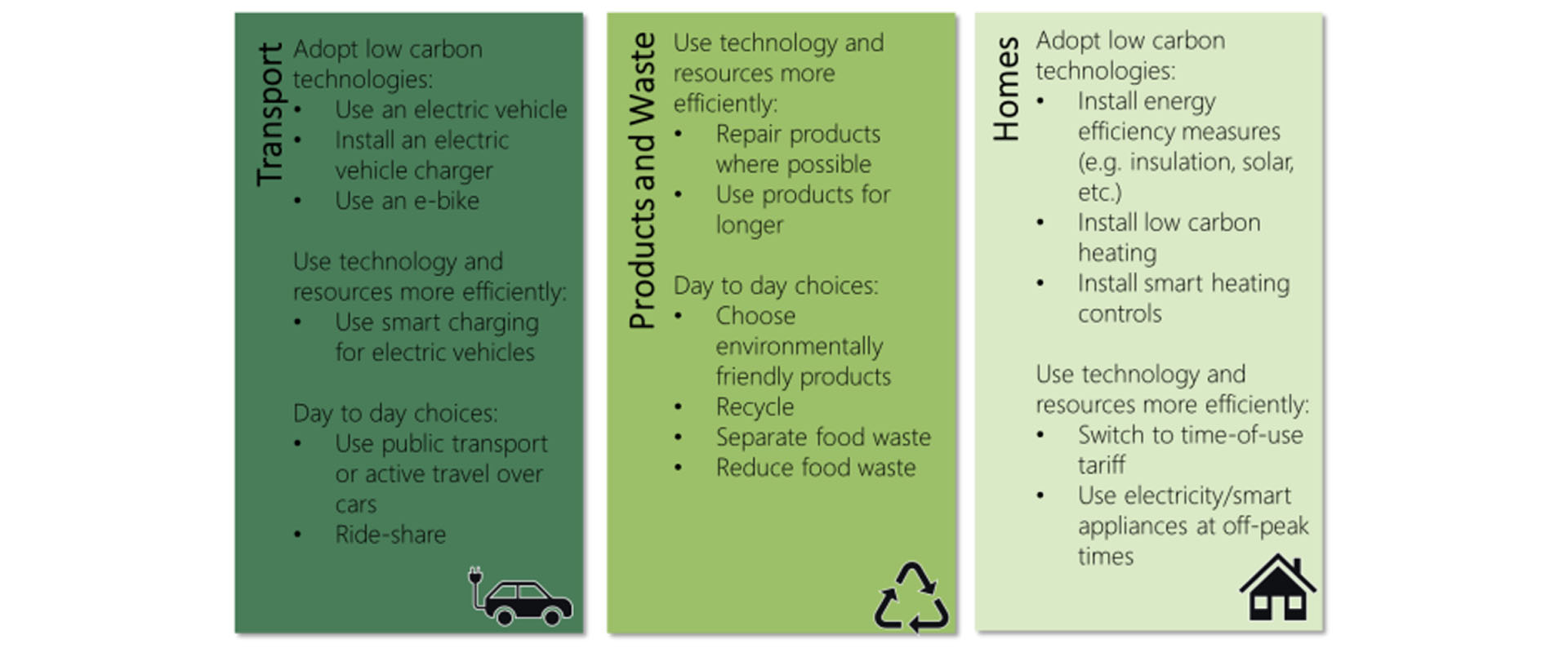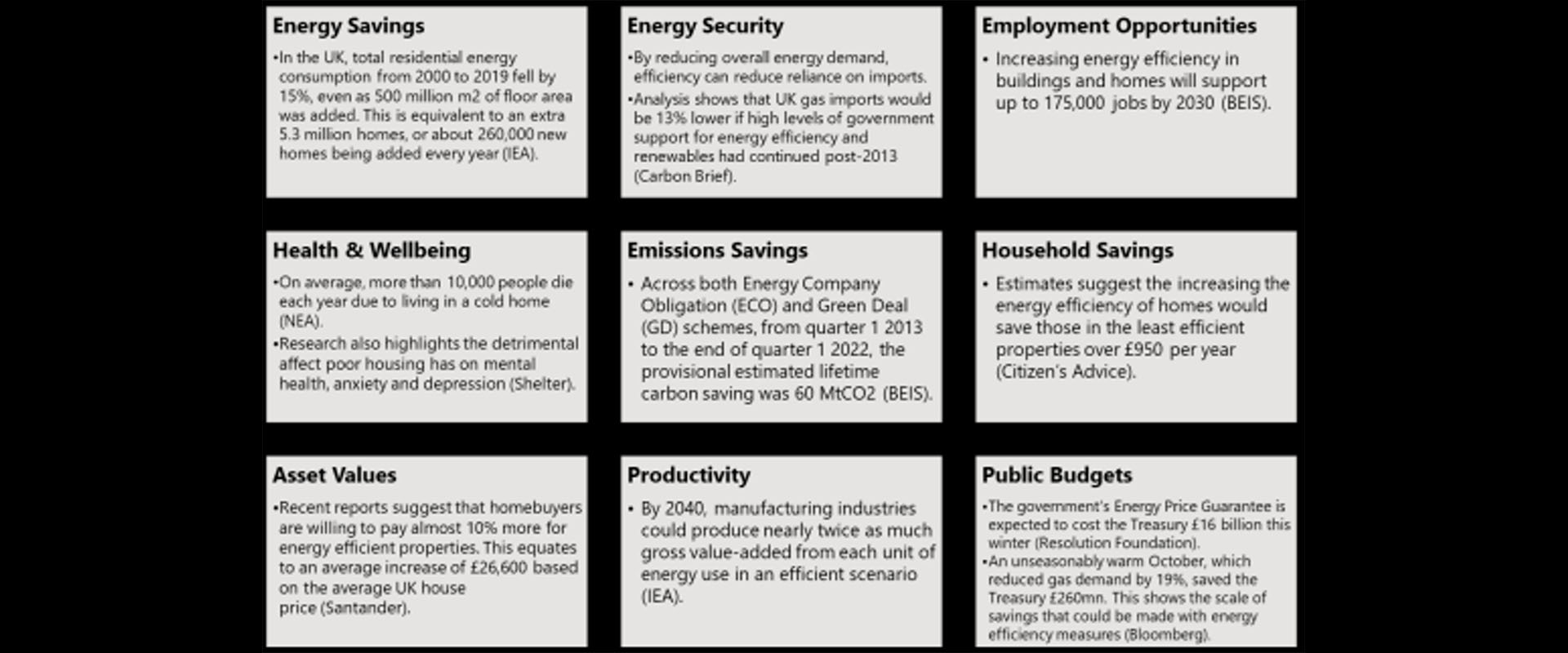So, just as the UK Government’s response to the high court ruling last July (and partly their response to the Mission Zero Review) is published, we should finish our bitesize summary of the Mission Zero Review before we get stuck into unpicking the even longer “Powering Up Britain”.
We just need to cover Pillar 5 and Pillar 6 which are titled “Net Zero and the individual” and Net Zero and the Future” respectively.
We are now in a net zero race. To stand still, delay or maintain the status quo is not an option.
Pillar 5 – Net Zero and the individual
This chapter beings with highlighting the 3 key principles that each individual needs in order for the transition to a net zero economy to become a reality….
- Agency: people need to be empowered to make the changes they wish to, engaged on the challenges, and armed with the information they need.
- Affordability: Low carbon products must be affordable.
- Accessibility: The necessary skills, services, and infrastructure must be accessible.
The key recommendations are highlighted with the importance of these areas needing to have appropriate legislation drafted and put in front of MP’s within this parliamentary session;
Key recommendations
The Skidmore report calls for with all necessary legislation recommended to be tabled within this parliamentary session:
- Gas free homes and appliances (no new or replacement boilers) and all homes sold to be EPC C by 2033.
- Consider a Net Zero Homes Standard and Net Zero Performance Certificate as future benchmarks for an energy efficient home.
- To expand the energy advice service in 2023 and create local retrofit hubs by 2025 to support consumers in making upgrades to their homes.
- Expand support schemes for low-income consumers such as the Boiler Upgrade Scheme (BUS), Home Upgrade Scheme (HUG) and Social Housing Decarbonisation Fund (SHDF).
- Invest in and increase skills and training capacity now for low carbon heating and energy efficiency measure installations.
- Consider innovative green finance products and catalyse heat pump investment
The average household
The reality is that every individual’s choice on a daily basis, has an impact on the UK’s journey towards Net Zero – people need to accept change and start to make more sustainable choices around transport, products & waste and possibly most importantly, their home.
“The average household produces 8.5 tonnes of CO2 each year, mostly from travelling, the energy used to create the products we buy and the food we eat, and from heating our homes”.
In some areas, individuals are starting to assist with the UK transition to a lower carbon economy with the UK now having over 1 million electric cars registered and over 55,000 heat pumps being installed in 2021 alone.
Unfortunately we are still not moving fast enough and other countries are moving ahead of the UK with France, Germany and Italy all installing more heat pumps than the UK, as the report says:
“… other countries are going further and faster. For example, the UK has a lower deployment of heat pumps per capita than other large European nations: in 2021, France, Italy and Germany were the largest markets, with 537,000 heat pumps installed in France, 380,000 in Italy and 178,000 in Germany”.
This chapter then goes on to highlight the potential benefits and cost savings that adopting technologies such as PV and heat pumps can have.
It even begins to talk about how the price of your home could be increased if energy efficiency and low carbon measures are fitted.
Could this be the beginning of the concept of ‘stranded assets’ moving from being a purely commercial concept into the residential market?
We’ve produced a white paper on stranded assets which you can download for free.

Summary of the role of individuals
.
Net zero can also add value
The report talks about how installing energy efficiency measures and low carbon heating will increase its value by around £10,000 on average.
Homes will also be able to produce power by installing, for example, solar panels, and then selling surplus energy – or indeed energy stored in electric vehicles – back to the grid. Green mortgage offers may be able to provide better rates for homes with higher energy efficiency ratings or who want to improve their property’s rating.
The positive news is that net zero should genuinely benefit individuals with improved health due to better air quality, more money in people’s pockets due to improved energy efficiency and a growing green economy providing jobs and opportunities across the UK.
However, the problem is often that the “spend now and save later” model doesn’t work for everyone and affordability, especially for low income households cannot and must not be ignored – this needs to be a fair and just transition
“Citizens Advice told us that “the largest barrier to consumer uptake across a range of low carbon technologies remains the initial upfront cost.
“It is vital that government takes action to ensure the distributional impacts of the net zero transition do not unfairly fall on certain groups or those living in certain locations, exacerbating inequalities
“We need to ensure net zero works for everyone. Government should ensure that people are empowered to be agents of change and that green choices are affordable and accessible. It should ensure that the transition is fair and does not leave anyone behind.”
Deterrents to progress
The Review has heard repeatedly that the expense of public transport is a deterrent to people. Public transport costs have risen faster than car travel since 2010.
This particularly affects those on lower incomes
“Choosing active travel or public transport, or using shared services, instead of a private road vehicle, can provide carbon savings, cut congestion, and deliver other benefits.”
However, part of the problem for the individual is that often the “right decision” for net zero is being actively discouraged by the economics of modern society – for example, costs for travelling by bus have increased by 80%, by train by 43% compared with driving a car 27%.
Just look at this case study from Germany!
CASE STUDY: Germany’s Deutschlandticket
Germany have recently announced that unlimited regional public transport across the country will cost just €49 per month next year, with the aim of cutting emissions, helping with the cost of living and supporting domestic tourism. The ‘Deutschlandticket’ will cost around €3 billion per year and is funded by both federal and state governments.
This follows a trial in which a monthly ticket for all public transport for three months cost just €9. The trial saw significant take up of public transport: over 52 million tickets were sold and according to a survey by the Association of German Transport Companies (NDV), around 20% of users had rarely used public transport before, with around 10% of trips replacing jurneys that would otherwise have been done in cars. 37% used it to travel to work.
Emissions were reduced by about 1.8 million tonnes of CO2 and traffic jams were reduced in 23 of the 26 cities surveyed.
Moving on from transport, the report looks at other areas associated to individual choices, such as waste, recycling and even repairing products rather than replacing them to help grow the circular economy (discussed in more detail in Pillar 3)
“Currently repairing products can be costly; we need to change this dynamic so that repairing products is cost-effective.”
Heating
The most pertinent section to the HVAC market is covered under the heading…… 5.3 Net zero homes, energy efficiency and low carbon heating
A very simple quote says….”Now is the time for government to create a mission for energy efficiency and low carbon heating.“
The key area of concern highlighted is that for all the work being done on generating cleaner energy, more must be done to reduce the demand in the first place
While the UK is forging ahead with the deployment of clean, green energy supply, we are falling behind on reducing energy demand – a necessity for reaching our net zero goals.
Clearly progress has not been fast enough;

This table summarizes the opportunities offered by energy efficiency;
.
Heat pumps are key to Net Zero
Talking more specifically about heat pumps, the report makes the following statement:
“Heat pumps, powered by low carbon electricity, are the central technology in the global transition to sustainable heating.”
The report does also highlight the reality that…..
“Some 1.8 million gas boilers are sold on average each year in the UK while just 37,000 heat pumps were sold in 2020, and 55,000 in 2021 (~3% of residential heating units).”
Looking at the report, it is clear to see why this is happening – we are simply hooked on gas, with the UK dependent on gas for 80% of our residential heating. The EU average is 38%.
It is no wonder we are hooked on gas as UK homes lose heat at a faster rate than most other comparable European countries meaning that high temperature gas fired heating systems easily mask this problem and are now offering a barrier to change.
Barriers to change
According to the report, a succinct way to summarize these barriers would be:
“While it is true that the UK must go further than many other European nations to eliminate greenhouse gas emissions from its homes, the UK also stands to reap great benefits from the change, such as warmer homes and lower bills
“Government should regulate through a suite of measures to create the conditions for sustained growth of new markets for low-carbon heat, so that at least 600,000 heat pumps are installed each year by 2028, and up to 1.9 million by 2033. The Government should implement the off-gas grid regulations that envisage the end of new and replacement fossil fuel heating systems in the mid-2020s.”
Now you might think that the future homes standard (i.e. the update to Part L of the building regulations) will solve these problems, and it does set out to increase energy efficiency and make homes ready for low carbon technologies (see our CPD on this).
However, it is yet another case of pushing the urgent action further down the road as the following case study from the review document highlights.
CASE STUDY: Future Homes Standard
The Government’s Future Homes Standard will mandate greater energy efficiency measures in homes built after 2025, but new houses built before then will not need to meet these standards. Retrofitting a new home to meet high energy efficiency standards – including replacing its gas boiler with a heat pump – could cost a household an average of £26,000, according to Climate Change Committee (CCC) data.
That is over five times more than the £4,800 it would have cost to meet the standard when a property was first built.xxxviii The Zero Carbon Homes Standard was supposed to be implemented from 2016 onwards but was scrapped in 2015 – this led to over a million homes being built to poor standards, which will ultimately cost the thousands of people who bought those homes millions of pounds.
Government is still committed to a manifesto pledge of building 300,000 homes every year by the mid-2020s, the delay to 2025 to enforce the Future Homes Standard will create a missed opportunity in making new builds more efficient and require costly retrofits. Loopholes could also allow developers to continue selling homes with gas boilers until 2026. The home building sector generates £38 billion in economic activity each year and is uniquely placed to support the government and consumers to achieve economic growth in the transition to net zero.699
The latest ONS figures show two-thirds of new homes in England are still being connected to the gas grid.
The benefits are not guaranteed – government must act now to ensure net zero works for everyone
Implementing policies
It is a common theme mentioned in the review that if the Government actually implemented the policies and ideas it consults on, we would be so much further down the road to net zero than we currently are – an example being;
“Government has an objective for as many homes as possible to reach EPC C by 2035, but this is not yet set out in legislation.”
The report actually calls for a new Net Zero Performance Certificate which is yet another similarity to the non-domestic market where industry has taken it upon themselves to develop the Net Zero Carbon building Standard
“Government needs to go further and faster to decarbonise our homes beyond EPC C and maximise the opportunities that energy efficiency and low carbon heating have to offer by looking ahead to a new NZPC (Net Zero Performance Certificate). That is why the Review is calling for a new mission, to bolster energy efficiency for households, including low carbon heating and solar.
“There is scope to utilise the EPC system better to help to support people to retrofit their homes. Currently, the EPC measure does not work for net zero.”
“The EPC rating of a property can sometimes show a worse score after installing a heat pump because of the inclusion of the cost of heating in the score, and this assessment being based on outdated assumptions “
This chapter of the review finishes by discussing ways to provide finance for the uptake of green technologies and how more proposals already on the table should be implemented before concluding with some ideas on how “heat as a service” may enable many of the barriers mentioned under Pillar 5 to be overcome
On to Pillar 6
It is ironic that Pillar 6 – Net Zero and the future is the shortest chapter in the review at only 29 pages!
As the report states: “This Review is looking beyond the urgent questions of today – to the opportunities for success in the future. The future is inherently uncertain – but we know some things will matter greatly.
“This whole section looks beyond Net Zero and how we can get R&D and technology for Net Zero ready for the future. It also covers Carbon leakage, carbon markets, setting standards, offsetting and international trade.
“Decisions taken today will be critical for the UK’s ability to reach net zero by 2050 in a progrowth and low-cost way. They will also set the stage for the kind of economy and society we want after 2050. The UK must apply this long-term view to all the issues raised in this Review.
“In particular, there are three areas that require action today, with a view to the 2040s, 2050s and beyond:
- Research and development. The UK must take advantage of its world-leading university and research sectors to deliver the technologies of the future and capture growth.
- Carbon markets. The UK must ensure that the true price of carbon emissions continues to be better reflected in the economy, going further on its Emissions Trading Scheme whilst mitigating the risk of carbon leakage, and setting out clear standards for the Voluntary Carbon Markets.
- The UK’s international presence. Following its successful COP26 presidency, the UK must review its international strategy for net zero.
“We must act now. On all three, we are at diverging paths. We can either choose to take advantage of emerging R&D discoveries and technological opportunities and to grow carbon markets, or miss the chance to support our innovators who could be enticed by other exciting opportunities abroad.”
Key recommendations
R&D and technology innovation for Net Zero
- Work backwards from 2050 and apply whole systems thinking to create a roadmap, by Autumn 2023, which details decision points for developing and deploying R&D and technologies that are critical for enabling the net zero pathway to 2050.
- Review how to incentivise greater R&D for net zero, including considering the role of clarity on research priorities and government support, tax credits, greater ring-fencing of R&D spend, and enabling regulations.
- Make regulatory processes more agile to match that of innovation by a) establishing up to three new R&D demonstrator projects, out to 2035, aligning with the ten-year missions set out by this review, and b) including in forthcoming work from the Office for Science and Technology Strategy (OSTS) how regulators can provide more opportunity for demonstrations for net zero technologies.
Carbon leakage
- Government should progress with the consultation on carbon leakage measures and speed up decision-making to enable government to implement effective future carbon leakage mitigations from 2026.
Carbon Markets
- To provide businesses with certainty and increase the incentives to invest in new, green technologies, by 2024 the Government should work within the UK ETS Authority to develop a pathway for the UK ETS until 2040.
International Trade
- By 2024 government should establish baseline environmental and climate protections in FTAs and for removal of trade barriers to environmental goods and services International Climate Leadership
- Strategic review of the UK's international climate leadership by 2023 and ensure the 2030 Strategic Framework on Climate and Nature provides practical direction for the UK's international climate and nature leadership.
Successes and areas for development
Pillar 6 also looks at technologies that are ready, ripe for development, or need more work
The ‘successes’ include: battery-electric passenger cars; hydrogen/fuel cell passenger cars; wind power; solar PV; large scale nuclear power; and electricity HVDC (High Voltage Direct Current) inter-connectors and HV (High Voltage) transmission systems.
On the ‘ripe for development’ list are: carbon capture, utilisation and storage; battery-electric and/or hydrogen fuel cells for heavy vehicles, buses and trains; bio-energy with carbon capture and storage; small, modular nuclear power; domestic heat pumps in substantial quantities; flow batteries; direct reduced iron.
And in the list of ‘more work required’ the report places: domestic retrofit insulation and heating in quantity; direct air capture of CO2; compressed air, liquid air, and gravity energy storage; nuclear fusion; and space-based solar power.
The conclusion for Mission Zero
The report is quite clear in its conclusion: “We are now in a net zero race. To stand still, delay or maintain the status quo is not an option.
“International markets and investors are seeking to make decisions now on where to invest for the future. The UK can either seek to provide the incentives for investment— as outlined in this Review— along with the wider opportunities for job creation and local and regional regeneration, or else these markets will go elsewhere.
“There is an active, strategic choice to be made. Does the UK wish to compete in the net zero race, with the chance to lead, or do we wish to simply observe from the sidelines?
“The Review recommends that, alongside the comprehensive prescription of policies across all sectors outlined in the Report, that the Government meet the net present danger of not acting fast enough by taking forward a series of no regrets and no excuses policy recommendations that can be delivered now, as soon as possible.
“We have termed these the ‘25 by 2025’ that the Government must seek to take forward recognising that there is no time to waste.
“This is not to suggest that these are the most important recommendations in the report— but to recognise the essence of acting sooner rather than later.
“The ‘25 by 2025’ set out twenty-five policies that the Review believes that the Government can take forward now, to deliver meaningful change that will have a positive impact on the UK’s net zero ambitions.
“Of course, other recommendations must be taken forwards, but we recognise the need to above all build long term certainty and stability for these measures to succeed.
“The ‘25 by 2025’ can provide an immediate signal of the Government’s intent to deliver on net zero, but also to remove the barriers that are preventing business and industry going further, faster”.
I hope my summarisation of the 340-page report has been helpful, Now we all need to act but we also need to make sure that people are listening!
Chris Newman is Net Zero Carbon Design Team Manager




